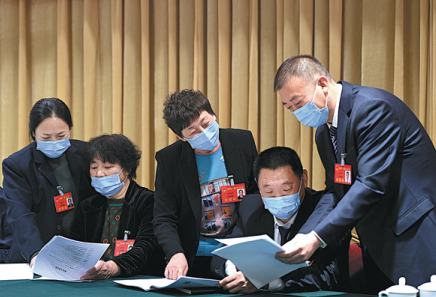Year of progress in green development
Updated: 2022-01-28

Delegates to the sixth session of the 13th Shanxi People's Congress discuss a provincial government work report delivered by Shanxi Governor Lan Fo'an. [Photo by Li Zhaomin for China Daily]
The past year has been a year that has made people believe "green mountains and clear waters are as good as mountains of gold and silver", said delegates and representatives at the two sessions of the provincial legislative and political consultative bodies in Shanxi, which were held from Jan 19-23.
"The increasing ratio of clean energy utilization and growing forest coverage are demonstrations of Shanxi's successful transformation toward green, sustainable development," said Qu Zhongrang, board chairman of Shanxi-based Dadi Environmental Investment Group and a representative of the 12th Shanxi People's Political Consultative Conference.
The past year saw an increase of 346,000 hectares of new forests in Shanxi and an addition of nearly 1 million households in using clean fuels for heating.
Qu's company is an enterprise mainly engaged in the repair and restoration of the ecological environment in Shanxi. Its projects have covered more than 9,700 square kilometers in the west of the province for improving soil-eroded areas through planting vegetation and using engineering measures.
Yang Yuguo, head of Anze county and also a member of the Shanxi People's Political Consultative Conference, said his county is one of the beneficiaries of the improved environment.
He said the county's afforestation efforts led to the addition of more than 2,100 hectares of trees last year, pushing its forest coverage rate to 75.8 percent.
The ever-growing area of vegetation and efforts in pollution control have also contributed to better air and water quality.
"The past year saw 295 days, or 80.8 percent of the whole year, boasting good and excellent air quality," Yang said. "Qinhe, the major river in Anze, saw its water quality stabilized at Grade III or better."
Grade III is a Chinese national standard for water that can be used for drinking, irrigation and industrial supply.
"While the improved environment benefits the health and livelihoods of locals, it also proves a big draw to investors," Yang said.
Unlike the two session's delegates and representatives who are keen on statistics, ordinary residents in Shanxi have also felt the improvements through what is happening around them.
Wang Guiqing, a resident in the village of Wujiazhuang in Shuozhou, is happy with the new change in heating this summer.
"We used to heat the rooms by burning coal in stoves," Wang said. "It filled the rooms with a pungent and choking smell and the chance of monoxide poisoning was high."
"We use an air heating system this winter, which not only eliminates all the pollutants but also keeps the indoor temperature at a stable 22 C."
Wang's village is one of the early beneficiaries of a clean heating program launched by the city of Shuozhou last year.
The city plans to invest in installing new, clean-fuel-fired heating systems in all its urban and rural areas. The program is scheduled to be completed by the winter of 2023.
Wu Jia contributed to this story.

